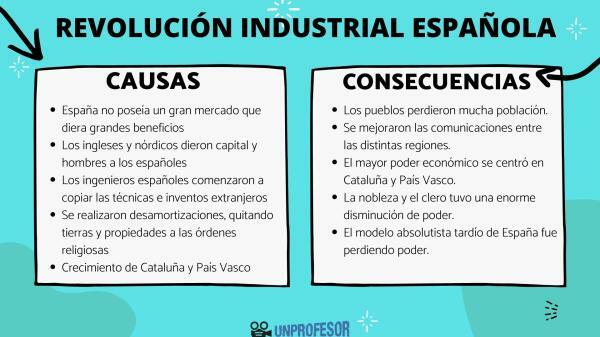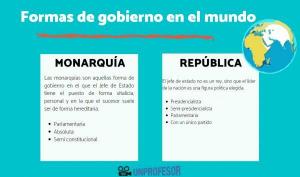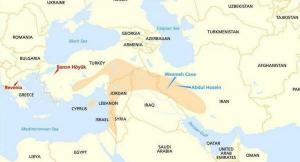CAUSES and CONSEQUENCES of the Industrial Revolution in Spain

The Industrial Revolution was a key process in the history of all the nations that lived through it, since it served to change these nations forever and bring about a new world. In Spain, the Industrial Revolution was more complicated, slower and later than in other regions, but it was still key to its history. To understand how the industrial process was in Spain, in this lesson we must talk about the causes and consequences of the Industrial Revolution in Spain.
The Industrial Revolution of Spain it is a strange case with respect to the rest of European nations, having a series of causes and antecedents different from the rest, in part caused by much later than the rest.
In general, we must say that the main causes of the Industrial Revolution in Spain were the following:
- Spain did not have a large market that would give great benefits, so it took more years to have that potential to be able to invest in the new technologies necessary for the Industrial Revolution.
- For years the Spanish bourgeoisie sent the so-called fellows to other regions such as Germany or England, the goal being that they learn the basics of their industrial systems, to return to Spain and start using them.
- Catalonia was well above of the national average in terms of surplus, thanks to which it was from one of the few regions that could sell enough to make a profit and thereby start its own Industrial Revolution, paving the way for the rest of regions.
- The English and Norse gave capital and men to the Spaniards to start the Industrial Revolution, since with it they generated a powerful commercial ally with large and numerous ports.
- Spanish engineers began to copy the techniques and foreign inventions, starting a great conversion of the industry.
- Elizabeth II and her government focused all her efforts on Spain became a great power, changing structures towards the conversion to an Industrial Revolution that they understood necessary.
- disentailments were made, taking land and properties from religious orders, in order to produce more product and with it enough profits for the revolution.
- The Illustrated turned out to be a great ally of the Bourbons for the Industrial Revolution, being those who contributed the greatest ideas for change.
- The growth of Catalonia and the Basque Country it made Spain able to enter the Industrial Revolution, being the regions where the industry was centered.
To continue this lesson on the causes and consequences of the Industrial Revolution in Spain, we must talk about the main consequences that this process brought to the Hispanic country. In this way we can understand that, although it was not as important a process as in other regions, it also had an incredible influence.
For all this, the main consequences of the Industrial Revolution in Spain were the following:
- In general it was a total failure and only a few regions achieved a true Industrial Revolution. Years later Spain did experience a transformation towards a real industry, but much later and wrong than in other regions.
- The towns lost a lot of population, as people moved to the cities to work in industry, leaving farm work behind. It was here that the cities we know today were born, although the towns maintained their influence a few more years, since the more the industry advanced, the fewer people lived in the towns and the greater the cities.
- Communications have been improved between the different regions, since better transport was needed for an Industrial Revolution. Even so, the transport networks were not good enough, since the mountainous relief of Spain made any type of transport difficult.
- The greatest economic power in Catalonia and the Basque Country, that experienced a greater revolution than the rest of the areas, caused greater nationalism and a feeling that they were more important areas than Spain itself. The rest of the regions could not have as much power as them, also causing envy and conflicts from other regions regarding the two of them.
- The nobility and the clergy had a huge decline in power, being the Industrial Revolution a process that made them lose power, especially by confiscation, and made the bourgeoisie increase its importance. The new social classes would remain until today, although the nobility and the clergy maintained greater power in Spain than in the rest of the regions that had suffered an Industrial Revolution.
- The late absolutist model of Spain was losing power, passing to a system closer to the capitalism of England. Even so the nobility, royalty and clergy maintained a huge influence, being, therefore, a capitalist system not quite correct, taking years to approach real British ideas.

If you want to read more articles similar to Causes and consequences of the Industrial Revolution in Spain, we recommend that you enter our category of History.


